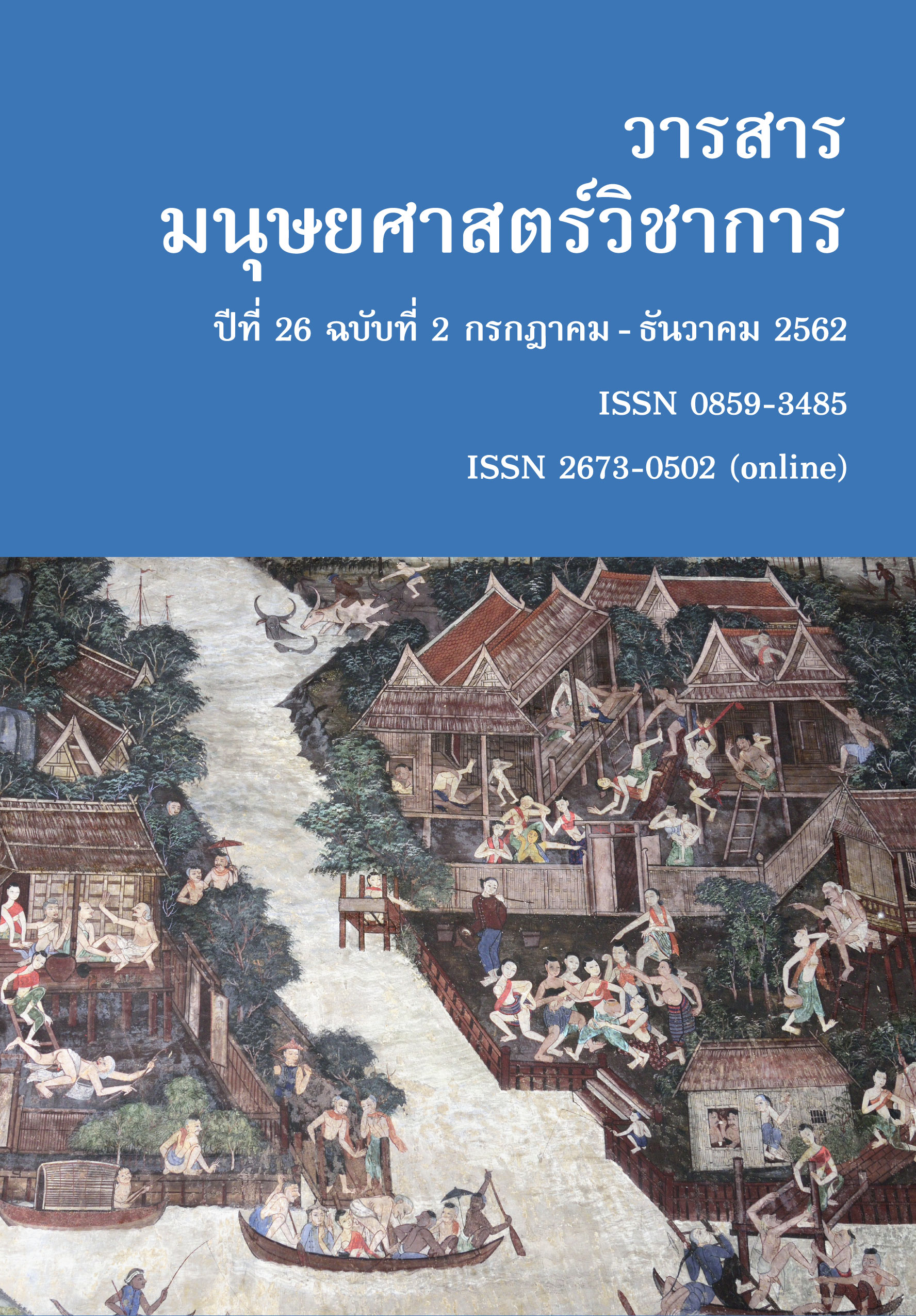นารีเรืองนาม ยอดสตรีในสายตากวีสยาม กับแนวทางการดำเนินชีวิตของหญิงและชายสมัยรัชกาลที่ 6
Main Article Content
Abstract
Naree Rueang Nam (Glorified Women) is a collection of poetry composed by various poets to praise women and suggest guidelines on conduct for women and men in the reign of King Rama VI. This essay aimed to investigate the image of women that appears in this work of panegyric literature, its guidelines on how a “good woman” should conduct her life, and its didactic content intended to admonish men on the behavior and status of women.
The study revealed that Naree Rueang Nam (Glorified Women) presents the images of “perfect women” who were patriotic and loyal to the monarchy and who also loved their families. These women embodied the ideals that the Siamese elite desired to inspire in the women in that period and were meant to be taken as good models. Regarding rules of behavior of the “good woman”, the poets ingeniously inserted guidelines on how women in the reign of King Rama VI should conduct their lives in their poetry. They argued that women who lived in the context of a modern nation no matter of what social class they were should be both good mothers and good wives at the same time and should apply their knowledge to contribute to the development of the nation and increasing its prosperity. These rules of behavior indicated the expectations of the Siamese elite concerning the role of women in that era of nation-building. In regard to the didactic content intended for men, poets admonished male readers to give Thai women the opportunity to better their social status, for they were competent, self-sacrificing, and courageous and were as essential to the prosperity and stability of the country as men were. In addition, equality in social status between men and women was a crucial indicator of the degree to which Siam had become a civilized nation.
Article Details
References
ปราณี สุรสิทธิ์. (2527). คำสอนสตรีไทยจากวรรณกรรมช่วงก่อนได้รับอิทธิพลตะวันตก (วิทยานิพนธ์มหาบัณฑิต สาขาภาษาไทย). มหาวิทยาลัยศรีนครินทรวิโรฒ, กรุงเทพฯ.
พรรณทิภา ชื่นชาติ. (2550). วรรณกรรมของกวีหญิงสมัยต้นรัตนโกสินทร์: ศึกษาด้าน มโนทัศน์ กลวิธีการนำเสนอ และอัตลักษณ์ (วิทยานิพนธ์มหาบัณฑิต สาขาวรรณคดีไทย). มหาวิทยาลัยเกษตรศาสตร์, กรุงเทพฯ.
มงกุฎเกล้าเจ้าอยู่หัว, พระบาทสมเด็จพระ. (2530). ปลุกใจเสือป่า. กรุงเทพฯ: มูลนิธิพระบรมราชานุสรณ์ พระบาทสมเด็จพระมงกุฎเกล้าเจ้าอยู่หัว.
มหาวิทยาลัยศิลปากร. (2513). เอกสารเรื่องเสือป่าและประมวลเรื่องเกี่ยวกับเสือป่า. พระนคร: คุรุสภา.
ราชบัณฑิตยสถาน. (2545). พจนานุกรมศัพท์วรรณกรรมอังกฤษ-ไทย ฉบับราชบัณฑิตยสถาน. กรุงเทพฯ: ราชบัณฑิตยสถาน.
วรารัชต์ มหามนตรี. (2557). โลกทัศน์ของคนไทยจากภาษิต. พิษณุโลก: ดาวเงินการพิมพ์.
ศรีนาถ สุริยะ, ท่านผู้หญิง. (2538). พระนางเจ้าสุวัทนา พระวรราชเทวีในรัชกาลที่ 6 วชิราวุธานุสรณ์สาร, 24(2), 5-24.
ศันสนีย์ วีระศิลป์ชัย. (2559). ลูกแก้ว เมียขวัญ (พิมพ์ครั้งที่ 4). กรุงเทพฯ: มติชน.
สหะโรจน์ กิตติมหาเจริญ. (2551). สุภาพบุรุษในพระราชนิพนธ์ในพระบาทสมเด็จ พระมงกุฎเกล้าเจ้าอยู่หัวกับวรรณกรรมศรีบูรพา (วิทยานิพนธ์ดุษฎีบัณฑิต สาขาวรรณคดีและวรรณคดีเปรียบเทียบ). จุฬาลงกรณ์มหาวิทยาลัย, กรุงเทพฯ.
สุมาลี ลิ้มประเสริฐ. (2538). ตัวละครหญิงในบทละครพระราชนิพนธ์พระบาทสมเด็จ พระมงกุฎเกล้าเจ้าอยู่หัว: สื่อในการอบรมหญิงไทย (วิทยานิพนธ์มหาบัณฑิต สาขาภาษาไทย). มหาวิทยาลัยศิลปากร, นครปฐม.
สุวดี ธนประสิทธิ์พัฒนา. (2534). สถานภาพทางสังคมของสตรีไทยในสมัยปฏิรูปประเทศ วารสารอักษรศาสตร์, 2(23), 3-19.
อัญชลี ภู่ผะกา. (2553). พระราชนิพนธ์ในพระบาทสมเด็จพระจุลจอมเกล้าเจ้าอยู่หัว และพระบาทสมเด็จพระมงกุฎเกล้าเจ้าอยู่หัว: วรรณคดีกับการสร้างชาติ (วิทยานิพนธ์ดุษฎีบัณฑิต สาขาภาษาไทย). จุฬาลงกรณ์มหาวิทยาลัย, กรุงเทพฯ.
Seeger, Martin และ นริศ จรัสจรรยาวงศ์. (2556). ตามรอยเรื่องราวของนักปฏิบัติธรรมหญิงโดดเด่นที่ถูกลืม คุณหญิงใหญ่ ดำรงธรรมสาร (2429-87) และปัญหาว่าด้วยความเป็นเจ้าของผลงานประพันธ์เชิงพุทธศาสนาอันสาคัญ ศิลปวัฒนธรรม, 34(6), 154-169.


